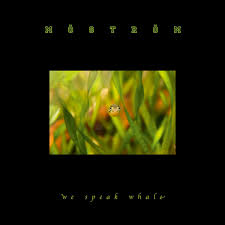Austrian trio Möström’s debut album, We Speak Whale sweeps the listener into an addictive, mesmerising water-world of sound. The Viennese group utilise a myriad of instruments in their work – hardly surprising when you consider that two of the band members, Susanna Gartmayer and Tamara Wilhelm have also performed with The Vegetable Orchestra – who, as their name suggests, create vibrant tunes with ordinary, everyday vegetables.
The versatile bass clarinet of Gartmayer provides both an industrial pounding and playful counterpoint, especially on opener ‘Werft’ (‘Dockyard’) and the jolly if disturbing ‘Humpty Dumpty’. On ‘I Dream Of Jeannie’, the clarinet weaves in and out with a theremin in an odd but compelling dance. Wilhelm’s self-proclaimed DIY electronics and Elise Mory (of Nitro Mahalia) and her keyboards help build a wall of sound which can by turn disturb and sooth.
We Speak Whale carries us out to sea as it progresses, combining drone with snatches of noise: radio hiss; bubbles; a discordant fairground organ. Despite the bleeps and pops and fizzes that inhabit the music, there is a smooth, liquid feel to it which perfectly encapsulates the album’s theme. It could be the perfect prequel to Kate Bush’s The Ninth Wave – as the drowning girl floats out to sea, past the end of the pier into the murky depths beyond. However, this album’s appeal is as much its otherworldliness: the distant lost radio waves bouncing off satellites and space debris. Anyone who has listened to NASA’s Voyager Recordings will recognise the similarity between We Speak Whale‘s musical dialogue and the probe’s tonal interpretations of the sounds from space. Are we alien-life receiving the ashes of the noise pollution Earth sends out into the ether and responding in kind – mimicking as best we can? Möström’s music could easily interweave with the Voyager records to create a soundscape that goes beyond the limits of our earth-bound imaginations and carries us out beyond the edge of the solar system.
Fans of dark ambient or spatial music – think Stockhausen or Lustmord – will know that this genre can genuinely take you to an altered state of consciousness. Never is this more true than on ‘Karlsplatz’ – a track named for both a major public square in the trio’s hometown of Vienna – and an Austrian synonym for its drug scene. A discombobulating, messy track with its threatening, grating squeals and rattles over a heady, thrumming background, ‘Karlsplatz’ continues the nightmare that the frankly terrifying ‘Humpty Dumpty’, and its playfully malevolent clarinet and battered piano begins, teaming a jaunty yet disturbing beat with the breathless fear of pursuit.
We Speak Whale‘s beauty is in its confusion and its strength as a concept comes from not setting out signposts to its ultimate meaning, but letting us decide where the music will take us. For those who will come to it open-minded and brave enough to embrace the darkness with the light, the known and the unknown, Möström’s debut album is an endless journey of inspiration.
<div class="fb-comments" data-href="http://thequietus.com/articles/18638-mostrom-we-speak-whale-review” data-width="550">


